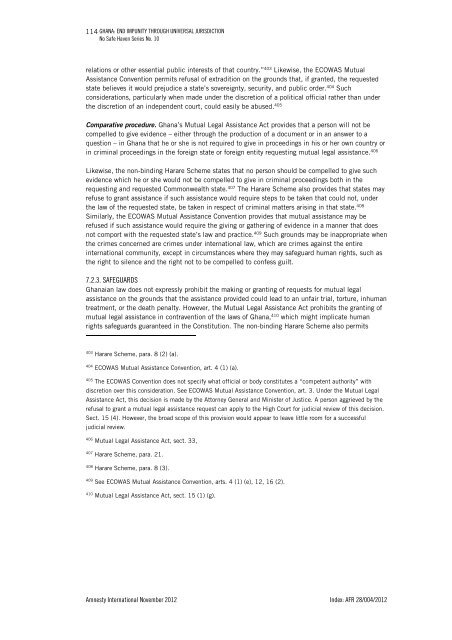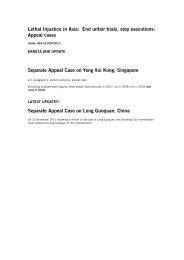Ghana - Amnesty International
Ghana - Amnesty International
Ghana - Amnesty International
Create successful ePaper yourself
Turn your PDF publications into a flip-book with our unique Google optimized e-Paper software.
114 GHANA: END IMPUNITY THROUGH UNIVERSAL JURISDICTIONNo Safe Haven Series No. 10relations or other essential public interests of that country.” 403 Likewise, the ECOWAS MutualAssistance Convention permits refusal of extradition on the grounds that, if granted, the requestedstate believes it would prejudice a state’s sovereignty, security, and public order. 404 Suchconsiderations, particularly when made under the discretion of a political official rather than underthe discretion of an independent court, could easily be abused. 405Comparative procedure. <strong>Ghana</strong>’s Mutual Legal Assistance Act provides that a person will not becompelled to give evidence – either through the production of a document or in an answer to aquestion – in <strong>Ghana</strong> that he or she is not required to give in proceedings in his or her own country orin criminal proceedings in the foreign state or foreign entity requesting mutual legal assistance. 406Likewise, the non-binding Harare Scheme states that no person should be compelled to give suchevidence which he or she would not be compelled to give in criminal proceedings both in therequesting and requested Commonwealth state. 407 The Harare Scheme also provides that states mayrefuse to grant assistance if such assistance would require steps to be taken that could not, underthe law of the requested state, be taken in respect of criminal matters arising in that state. 408Similarly, the ECOWAS Mutual Assistance Convention provides that mutual assistance may berefused if such assistance would require the giving or gathering of evidence in a manner that doesnot comport with the requested state’s law and practice. 409 Such grounds may be inappropriate whenthe crimes concerned are crimes under international law, which are crimes against the entireinternational community, except in circumstances where they may safeguard human rights, such asthe right to silence and the right not to be compelled to confess guilt.7.2.3. SAFEGUARDS<strong>Ghana</strong>ian law does not expressly prohibit the making or granting of requests for mutual legalassistance on the grounds that the assistance provided could lead to an unfair trial, torture, inhumantreatment, or the death penalty. However, the Mutual Legal Assistance Act prohibits the granting ofmutual legal assistance in contravention of the laws of <strong>Ghana</strong>, 410 which might implicate humanrights safeguards guaranteed in the Constitution. The non-binding Harare Scheme also permits403Harare Scheme, para. 8 (2) (a).404ECOWAS Mutual Assistance Convention, art. 4 (1) (a).405The ECOWAS Convention does not specify what official or body constitutes a “competent authority” withdiscretion over this consideration. See ECOWAS Mutual Assistance Convention, art. 3. Under the Mutual LegalAssistance Act, this decision is made by the Attorney General and Minister of Justice. A person aggrieved by therefusal to grant a mutual legal assistance request can apply to the High Court for judicial review of this decision.Sect. 15 (4). However, the broad scope of this provision would appear to leave little room for a successfuljudicial review.406Mutual Legal Assistance Act, sect. 33,407Harare Scheme, para. 21.408Harare Scheme, para. 8 (3).409See ECOWAS Mutual Assistance Convention, arts. 4 (1) (e), 12, 16 (2).410Mutual Legal Assistance Act, sect. 15 (1) (g).<strong>Amnesty</strong> <strong>International</strong> November 2012 Index: AFR 28/004/2012
















